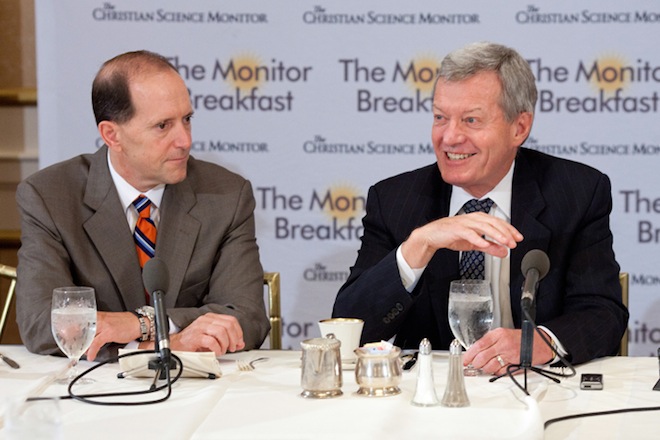The bipartisan duo of Sen. Max Baucus (D-MT) and Rep. Dave Camp (R-MI) frequently discuss their optimism for passing comprehensive tax reform by the end of next year — an ambitious goal that Congress last achieved in 1986.
“Stay tuned,” Baucus told a room full of reporters Friday. “It’s coming.”
But the chairmen of the two powerful tax-writing committees — Baucus chairs the Senate Finance Committee and Camp chairs the House Ways & Means Committee — will not provide answers to the most basic questions about tax reform, including which tax breaks they would get rid of and whether reform would raise any net revenue.
At a Washington breakfast Friday organized by the Christian Science Monitor, Baucus and Camp were asked by a reporter to name one tax expenditure they’d be willing to limit or eliminate as part of their reform package. Neither would name a single one.
“I do have those but I’m not going to reveal it today,” Camp laughed.
Baucus didn’t attempt to address the question.
Asked if they’d be willing to scale back the home mortgage interest deduction — one of the most expensive (and popular) tax breaks — Camp wouldn’t say. “Everything is going to be on the table. We’re going to look at all of the items,” he said. “If there is consensus the items are going to be reformed, and if not, it’ll stay where it is.”
But the Republican was willing to rule out one policy: “I don’t support a carbon tax,” he said.
Then there’s the question of whether the overall tax reform package will raise net revenues — a fundamental fiscal policy difference between Democrats and Republicans that has precipitated the series of near-government shutdowns and defaults since early 2011. Republicans, particularly in the House, are adamantly opposed to new revenues and Democrats promise they’ll reject major fiscal reforms unless revenues are in the mix.
Approached by TPM after the breakfast, Camp didn’t have a clear solution to that problem.
“I don’t think it’s going to be resolved until you have a bill,” Camp said of the revenue divide. “Clearly we’re in different places on that, but I’m not going to spend my time focused on that, because you’re not going to be able to address that issue until you know what policies are behind that. Simply just a revenue increase is not going to happen.”
Earlier in the week, TPM asked Baucus the same question, and he demurred.
“We haven’t gotten that far yet,” said Baucus, who isn’t seeking reelection in 2014.
The lack of answers to these questions bodes ill for reform, even if Baucus and Camp — who are among the less ideologically rigid members of their parties — are capable of agreeing on a bill between the two of them. Beyond the divisions between Democrats and Republicans, tax reform will invariably have its share of opponents — including from powerful, entrenched special interests who are determined to protect unpopular and unproductive tax breaks. Without a clear framework to coalesce around and fight for, the effort faces daunting odds.
And yet Baucus and Camp are upbeat about the prospects of success on the first major overhaul of the tax code in a generation. They’ve launched a website, taxreform.gov, and a Twitter handle, @simplertaxes. They say they’re planning a road trip in multiple, as yet-undecided cities to seek advice from ordinary Americans.
“When we say the rubber is going to hit the road — we’re going on road trips,” Camp said. “We’re going to travel the country and we are going to talk to business owners, families and individuals and really try to get a read from the country.”










